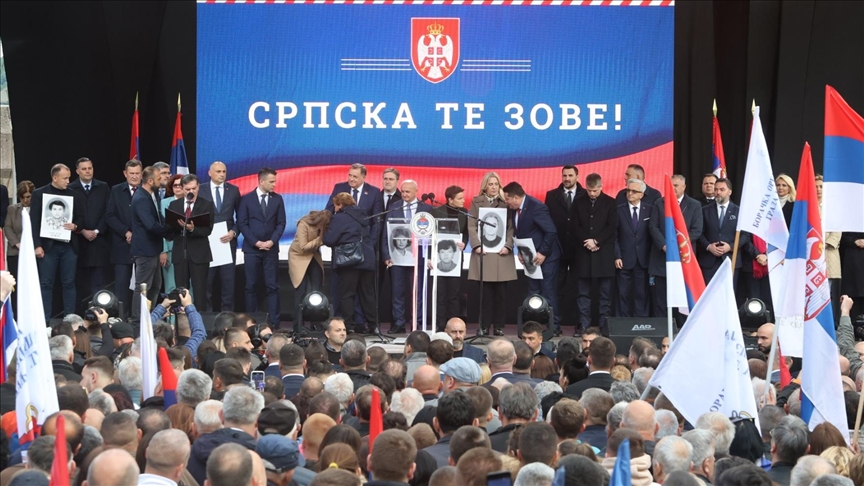Bosnian Serbs hold demonstrations against UN draft resolution on Srebrenica genocide
Thousands of Bosnian Serbs gather to deny 1995 genocide in Srebrenica town, where more than 8,000 Bosnian Muslims were killed
 Bosnian Serbs attend a demonstration denying the Srebrenica genocide
Bosnian Serbs attend a demonstration denying the Srebrenica genocide
BELGRADE, Serbia
Bosnian Serbs have organized a demonstration in reaction to a draft UN resolution to designate July 11 as a remembrance day for the Srebrenica genocide, slated to be discussed in the organization's General Assembly in May.
Thousands of Bosnian Serbs participated in the demonstration held Thursday in Banja Luka city and organized by Republika Srpska, one of the two entities that make up Bosnia and Herzegovina.
Republika Srpska's President Milorad Dodik apologized to victims, but denied that what happened in July 1995 constituted genocide in Srebrenica, an eastern town where Serb forces killed more than 8,000 Bosniak Muslims during the Bosnian war.
"Here, on behalf of the Republika Srpska entity, I would like to express my respect to all the victims and express my condolences to their families. What happened there was a crime that occurred after the fatigue, hatred, and pain of the war, but it was not genocide.
Dodik also claimed that nearly 3,500 Serbs were killed in Srebrenica during the war.
"Do not do this, because it does not contribute to life in Bosnia and Herzegovina. This separates us permanently. We do not want to live with you who want to say that the Serbian people are genocidal. We do not want to be in the same country with you and we will not be," said Dodik.
He added that Serbs do not want war but that if the UN General Assembly approves the draft resolution on the "11 July International Srebrenica Genocide Remembrance Day," entity officials would gather in the town and show that it "belongs to them."
"When you decide on this issue, it means that you have divided Bosnia and Herzegovina. We will leave as soon as the conditions are suitable. Banja Luka will one day be an integral part of Serbia," said Dodik.
Also speaking at the event, Serbian National Assembly Speaker Ana Brnabic said Belgrade would oppose such action at the UN.
Underlining that Serbia respects the 1995 Dayton Peace Agreement that ended the war in Bosnia and Herzegovina, she vowed to support the Serb entity and Serbs living there.
The Bosnian Muslims were killed in Srebrenica, despite the presence of Dutch peacekeeping troops, as Serb forces attempted to wrest the territory from Bosnian Muslims and Croats to form a state.
The UN Security Council declared Srebrenica a "safe area" in the spring of 1993. But troops led by Gen. Ratko Mladic overran the UN zone. He was later found guilty of war crimes, crimes against humanity, and genocide.
Dutch troops failed to act as Serb forces occupied the area, killing 2,000 men and boys on July 11, 1995 alone.
About 15,000 residents of Srebrenica fled to the surrounding mountains, but Serb troops hunted them down and killed 6,000 more people.
The bodies of victims have been found in 570 areas across the country.
In 2007, the International Court of Justice in The Hague ruled that a genocide had been committed in Srebrenica.
Anadolu Agency website contains only a portion of the news stories offered to subscribers in the AA News Broadcasting System (HAS), and in summarized form. Please contact us for subscription options.


